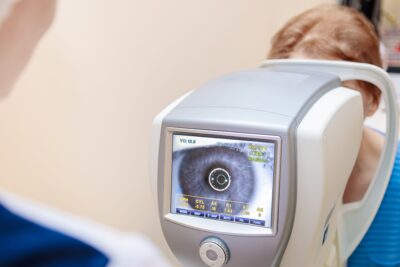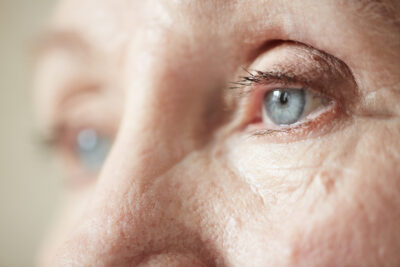Blog post
What Causes Loss of Side (Peripheral) Vision / Tunnel Vision?
Peripheral vision loss, or tunnel vision, can range from mild, with just a few blind spots, to severe, where an individual is only able to see straight ahead, as if looking through a tunnel.
This can be a symptom of various underlying health issues, some of which may only cause significant peripheral vision loss in advanced stages.

Here’s a deeper look into these causes, how they lead to loss of side vision, and the available treatment options:
1. Glaucoma

In its early stages, glaucoma often has no noticeable symptoms. As the condition progresses, however, you may experience vision loss, particularly in your peripheral vision. Over time, this can lead to tunnel vision or even complete blindness if left untreated.
The first step in treating glaucoma is having an eye test and getting a diagnosis. It is generally recommended that we have our eyes tested every 2 years. Anyone over 40 with a family history of glaucoma is entitled to an NHS funded eye test in England, Scotland and Wales. If you struggle to get to an Optician unaccompanied, then you may be entitled to have an NHS eye test at home.
If glaucoma is suspected, your Optometrist will be able to refer you for treatment which may include laser therapy, eye drops, medication or surgery in some severe cases.
Aside from having regular eye tests, leading a healthy lifestyle and managing underlying conditions like diabetes or high blood pressure can help reduce the risk of glaucoma.
2. Stroke

A stroke affecting the visual pathways in the brain can lead to loss of peripheral vision. This can be sudden and may affect one or both eyes depending on the location and severity of the stroke.
Immediate medical intervention is critical for stroke. Rehabilitation and, in some cases, special vision aids may help manage the loss of vision.
3. Migraines

It is fairly common for migraines to cause temporary visual disturbances. These disturbances might start with small flickering spots or flashes of light in your vision, which slowly grow and might cover more of your vision, reducing your ability to see around the edges or sides - this is what creates the sensation of "tunnel vision."
Typically, these visual disturbances tend to last around 20 to 30 minutes before they go away, but this can vary from person to person.
Treatment includes over-the-counter or prescription medications to manage migraine symptoms and prevent future attacks. Identifying what triggers a migraine can help to avoid them in future.
4. Conditions affecting the retina

Conditions and treatments affecting the retina can impact peripheral vision because the retina is crucial for processing visual information from the entire visual field, including the edges.
Certain conditions, such as retinal detachment, and certain treatments for diabetic retinopathy, like panretinal photocoagulation, can lead to loss of peripheral vision.
5. Conditions affecting the optic nerve

Conditions affecting the optic nerve can significantly impact peripheral vision, as the optic nerve is responsible for transmitting visual information from the eyes to the brain.
Disorders such as optic neuritis and papilloedema involve inflammation or swelling of the optic nerve, which can lead to loss of peripheral vision.
Treatments often focus on addressing the underlying cause, whether it's an autoimmune response, infection or increased pressure.
Regular eye tests play a key role in early identification and effective treatment of these optic nerve issues.
FAQs
Can alcohol cause tunnel vision?
There is no scientific evidence to show that alcohol directly causes loss of peripheral vision. However, excessive alcohol consumption can lead to changes in vision and overall neurological function. These changes may sometimes include blind spots, which could occur in the peripheral vision for some individuals.
Can dehydration cause loss of side vision?
While there is no widely recognised evidence linking dehydration to the loss of peripheral vision, it can lead to temporary visual disturbances which may include blurriness or blind spots, which some might be perceive as affecting the peripheral vision.
Can stress/anxiety cause tunnel vision?
Stress and anxiety themselves do not directly cause loss of peripheral vision according to scientific evidence. However, they can contribute to the onset of migraines, which are known to cause loss of peripheral vision. Such symptoms are usually temporary, but if they persist and impact daily activities, then it’s a good idea to get an eye test to rule out other possible causes.
Can high or low blood pressure cause tunnel vision?
Direct loss of peripheral vision is not typically recognised as a symptom of high or low blood pressure. Nonetheless, extreme fluctuations in blood pressure can impact the blood flow to the retina and optic nerve, potentially causing visual disturbances. Consistent or severe changes in vision related to blood pressure should be checked during an eye test.
Can you drive with tunnel vision?
In the UK, specific vision standards must be met to legally drive. The DVLA sets these standards, which include requirements for peripheral vision. According to the DVLA, car and motorcycle drivers must have a horizontal visual field of at least 120 degrees. There are different standards for bus and lorry drivers.
Read more here: https://www.gov.uk/guidance/visual-disorders-assessing-fitness-to-drive



